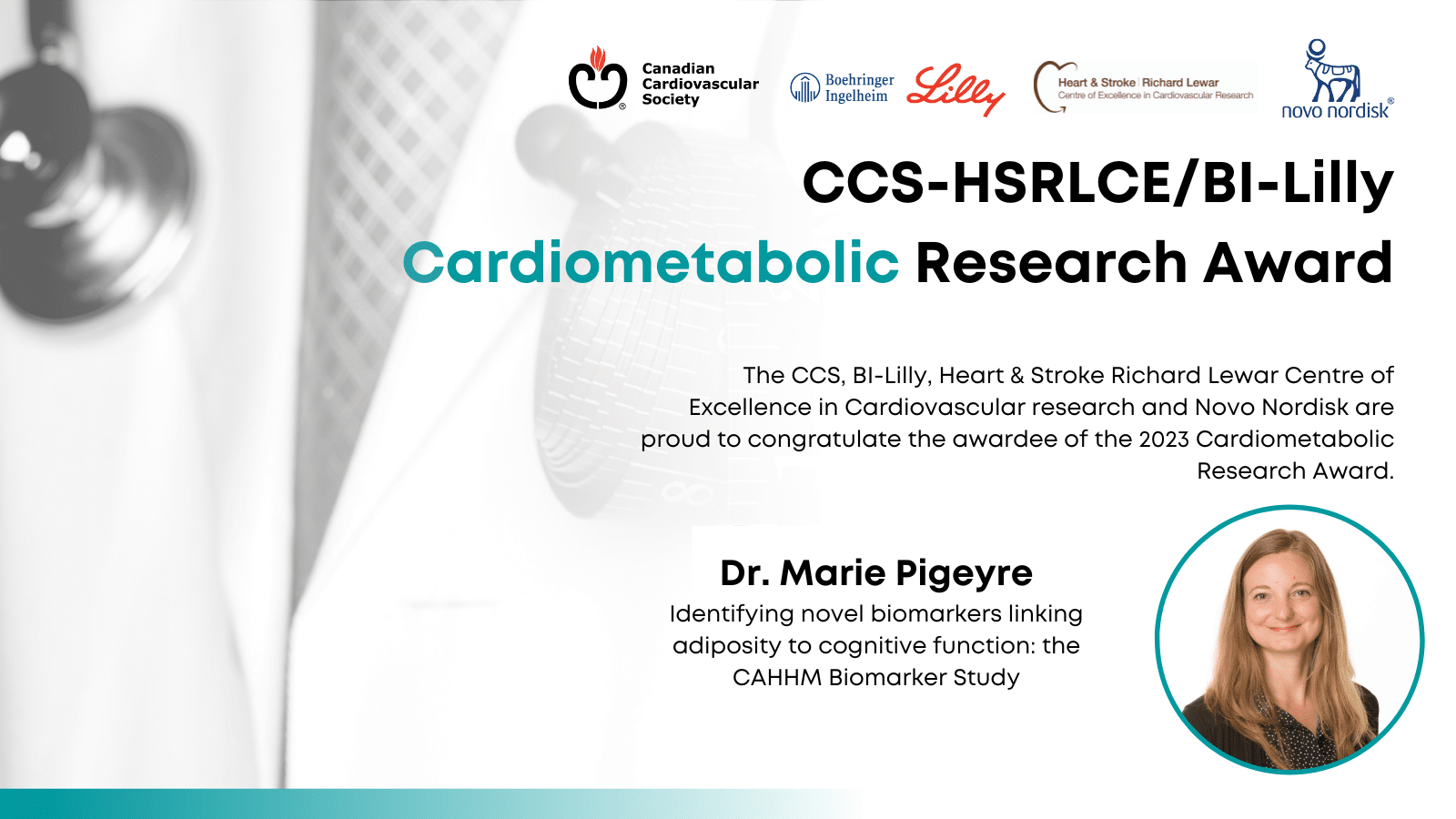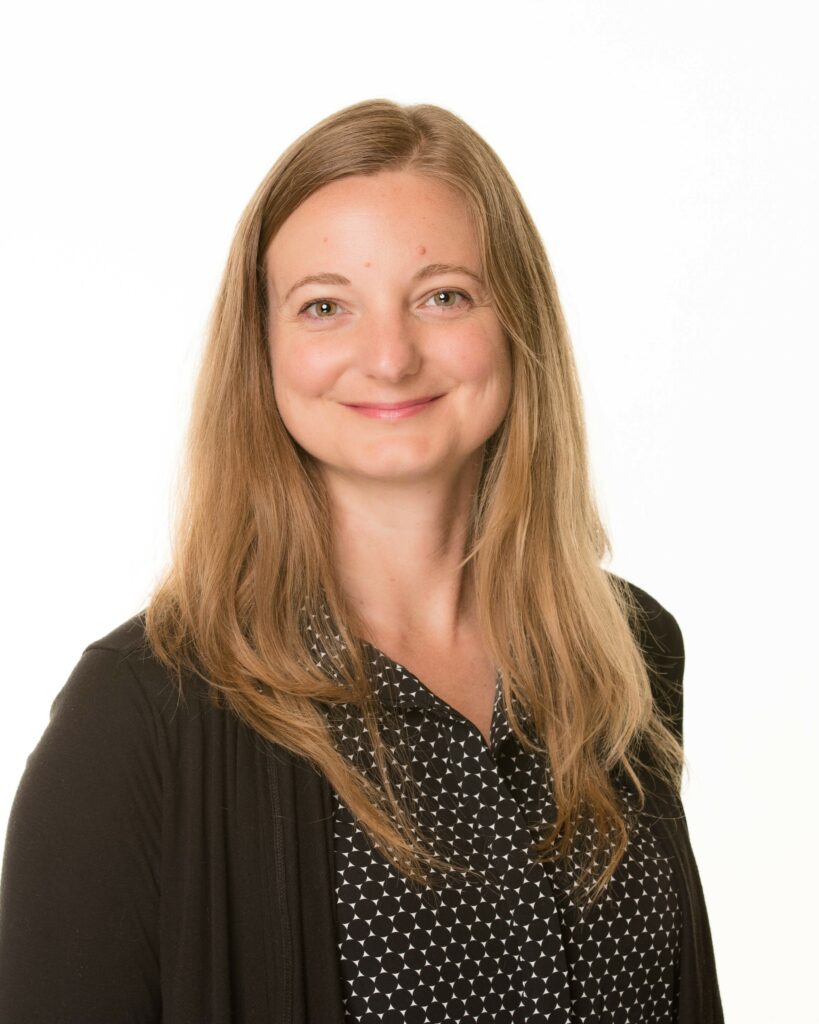

Clinician-scientist Dr. Marie Pigeyre is the winner of the CCS Cardiometabolic Research Award for her project Identifying novel biomarkers linking adiposity (body fat) to cognitive function: the Canadian Alliance for Healthy Hearts and Minds (CAHHM) Biomarker Study. Dr. Pigeyre completed a MD in endocrinology and a PhD in epidemiology and genetics at the University of Lille in France. She came to Canada for post-doctoral and international fellowships at McMaster University, studying diabetes and obesity biomarkers and the link to cardiovascular disease. Since 2019, Dr. Pigeyre has been an Assistant Professor in the Department of Medicine at McMaster.
We sat down with Dr. Pigeyre to discuss her research program and find out how it could change practice and impact the lives of Canadians.
Q: Let’s start by asking you why you selected this area of research?
A: I’ve been interested in understanding why obesity is associated with cardiovascular disease for a long time, and now I’m expanding my research to better understand the link between adiposity (body fat), cardiovascular consequences, and cognitive decline. This research is fascinating because there are still so many questions in the field. We think that the location of adiposity in the body is important. Fat can be stored under the skin (subcutaneous fat) or inside the belly, wrapped around the organs, and in the liver. We think it’s the fat stored in the belly (visceral fat) that is responsible for cardiovascular complications and cognitive impairment.
Q: What kind of biomarkers are you looking for?
A: Visceral fat produces little molecules that move into our blood (also called biomarkers) that can be measured. We are most interested in adipokines, which are cell-signalling molecules (cytokines), secreted by adipose tissue.
Q: What’s the value of this research?
A: If we identify biomarkers that are involved in the contribution of visceral adiposity to cognitive impairment, we can develop a screening test to early identify individuals at high risk, and develop new personalized targets for intervention. For example, if a biomarker can be modified with a specific drug, we could use that drug to protect individuals. Or, if a biomarker can be modified with physical activity or a specific diet intervention, other treatment approaches could be used to reduce the risk.
Q: How did this project get started?
A: We are capitalizing on the CAHHM (Canadian Alliance for Healthy Hearts and Minds) cohort at the Population Health Research Institute, which has recruited more than 8,000 Canadians. Each participant had an MRI of the brain and abdomen at baseline to identify body fat location, provided a blood sample, and completed questionnaires on cognitive function. Six years later, we are studying a subset of 1,400 of those participants, half of whom developed cognitive impairment (“cases”) and the other half who did not (“controls”). Using a very modern platform for genomics and proteomics, we can measure up to 300 biomarkers in a little drop of the blood they provided at baseline.
Q: At what stage are you in the research?
A: We are re-contacting the participants, identifying the ones who developed cognitive impairment and the ones who did not.
Q: When do you expect this study to be completed?
A: In the next six months, we want to have all the biomarker measurements. In the subsequent six months, we want to have the statistical analysis done. We hope to have preliminary results in a year.
Q: What knowledge gap does this fill?
A: I hope we better understand the specific molecules and inflammatory markers produced by adiposity that impair cognition. The goal is to keep brains healthy for as long as possible.
Q: What does this fellowship award mean to you, personally?
A: It’s great recognition for my work and an immense honour. But it’s not only for me. This recognition is also for all the research team involved in the CAHHM cohort and all the participants.
Q: How many people are involved in the research team?
A: The CAHHM cohort is a large cross-Canada research effort, led locally here by Dr. Sonia Anand. The team is diverse, including cardiologists, neurologists, radiologists, nutritionists, coordinators, and others.
Other News
See AllHeart Month: Celebrating Canadian Cardiovascular Research
February 1, 2024
This Heart Month, we’re focusing on the importance of fostering growth of peer-reviewed Canadian...
Heart Month Research Fellowships & AwardsDr. Thomas Roston Wins CCS-BMS Hypertrophic Cardiomyopathy Research Award
November 27, 2023
Dr. Thomas Roston, a cardiologist and clinician-scientist at St. Paul’s Hospital and Vancouver...
HCM Research Fellowships & AwardsGuided Ultrasound Study Aims to Deliver Therapy to Reverse Common Genetic Heart Disease
November 17, 2023
Dr. Brandon Helfield, an Assistant Professor at Concordia University in Montreal, is the winner of a...
HCM Research Fellowships & Awards